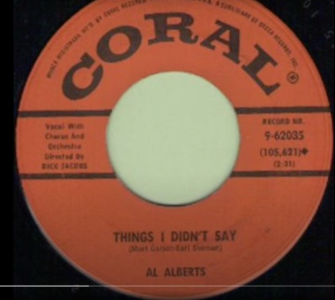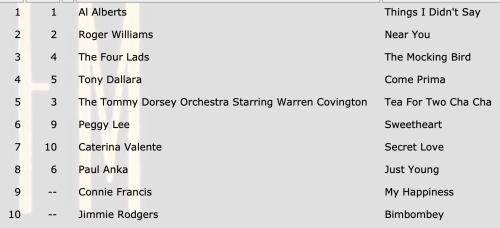#28: Things I Didn’t Say by Al Alberts
City: Hull, PQ
Radio Station: CKCH
Peak Month: December 1958
Peak Position in Hull ~ #1
Peak position in Vancouver ~ did not chart
Peak Position on Billboard Hot 100 ~did not chart
YouTube: “Things I Didn’t Say”
Lyrics: N/A
Al Albertini was born in Chester (PA) in 1922. In his childhood, young al appeared on a radio show from Philadelphia called The Horn and Hardart Children’s Hour. Horn and Hardart’s slogan was “Less work for mother dear whose gentle hands, lead us so kindly through little folk lands. We’ll give her happiness, each kindness, each caress repaid with thoughtfulness. Less work for mother dear.” After high school graduation in 1940, he was drafted into the United States Navy after the nation entered WWII in December 1941. While he was in the navy, Albertini met Dave Mahoney, and the pair discovered a mutual interest in singing and music. After WWII, they added Rosario “Sod” Vaccaro and Lou Silvestri to become a foursome. By the late 40s they were billed as The Four Aces. They released their first single, “Baby, wha hoppen”, in 1949. When they recorded “(It’s No) Sin” in 1951, they couldn’t get a record company to record the song. So Al Albertini started Victoria Records and made a recording. The single soared to #4 on the Billboard pop chart, and spent 22 weeks on the survey. On the Cashbox Best Selling Singles chart, the song spent nine non-consecutive weeks at number-one, between November 3, 1951, and January 5, 1952. The song was also number-one for seven weeks on Your Hit Parade.
After the success of “(It’s No) Sin”, the Four Aces got signed with Decca Records. In early 1952, “Tell Me Why” peaked at #2 on the national pop charts in the USA. From January 19 to February 16, 1952, both songs were charting in the Top Ten on the Billboard and Cashbox pop singles charts. As well, in 1952, The Four Aces charted into the Top Ten with “Perfidia” and “Should I”, with “Heart And Soul” stalling at #11. in 1953, Decca Records had Al Alberts release a solo recording titled “Please Tell Me”, which got little attention beyond Philadelphia and Trenton (NJ).
In early 1954, Al Alberts released a second solo single titled “Bandera (The Texas Polka)”. Cashbox graded it a B in the Jan. 23, 1954 issue: “The lead voice of the Four Aces, Al Alberts gets a choral backing as he bounces through a pleasing polka novelty. Colorful item.” Billboard rated it 74/100 in the same date’s issue: “New polka ditty, this time about Texas, receives a straight-forward warble from Alberts, backed by a chorus and the ork.” It was a Top Ten hit in Chicago, Philadelphia and Albuquerque (NM).
In February 1954, “Stranger In Paradise” was released by Tony Bennett, the Four Aces and Tony Martin. The song spent two non-consecutive weeks at number-one on the Cashbox Best Selling Singles chart. It was also a #6 hit in England. Simultaneously, “That Gang That Sang ‘Heart Of My Heart'”, spent eleven non-consecutive weeks with “Stranger In Paradise” in the Top Ten in the USA between mid-December 1953 and March 1954. Later that year, “Three Coins In The Fountain” peaked at #1 in the USA and #5 in England. The song was ranked by Billboard magazine as the #8 song for the year 1954.
In 1955, the Four Aces continued to chart successfully with a Top 5 cover of the Chordettes “Mr. Sandman” on Billboard, and a number-one Cashbox hit for six non-consecutive weeks in the winter of 1954-55. From January 8 to March 5, 1955, the Four Aces had both their version of “Mr. Sandman” and “Melody Of Love” in the Top Ten. The latter tune was a number-one hit on the Cashbox Best Selling Singles chart, sharing the position for seven weeks with both Billy Vaughan & Orchestra, and David Carroll & Orchestra.
In the fall of 1955, The Four Aces had another number-one hit in the USA with “Love Is A Many-Splendoured Thing”. The single peaked at #2 in England, #3 in Australia and #6 in Belgium. In the winter of 1955, “A Woman In Love” was recorded by the Four Aces. The song was from the musical Guys and Dolls. However, it stalled at #14 and was edged out of the Top Ten by the new sounds of pop, rock and R&B. Record buyers were snapping up copies of “At My Front Door” by the El Dorados; “Only You” by the Platters, and “I Hear You Knocking” – Gale Storm’s cover of the Smiley Lewis original; and “Daddy-O” a Fontaine Sisters cover of female rockabilly singer Bonnie Lou; Tennessee Ernie Ford’s “Sixteen Tons”; and the Four Lads “Moments To Remember”.
1956 was even more challenging for The Four Aces. Elvis Presley shook pop culture with his appearances on The Ed Sullivan Show, and his chart-topping hits “Heartbreak Hotel”, “I Want You, I Need You, I Love You”, “Hound Dog”, “Don’t Be Cruel” and “Love Me Tender”. And there was Carl Perkins singing “Blue Suede Shoes”, Jim Lowe with “Green Door”, Bill Doggett with “Honky Tonk Pt 2”, Frankie Lemon and The Teenagers with “Why Do Fools Fall In Love”, Bill Haley & His Comets with “See You Later Alligator”, Fats Domino, Little Richard, Gene Vincent, The Platters with “The Great Pretender” and “My Prayer”, the Cadets and more.
To be sure, traditional pop recording artists were still racking up solid record sales. Nelson Riddle, Gogi Grant, Morris Stoloff, Doris Day, Dean Martin, Kay Starr, Don Cherry, Patti Page, and Pat Boone, were all vying for the attention of the record-buying and jukebox playing audiences. But rock ‘n roll was on the ascendant. And The Four Aces were among the many recording acts that were being eclipsed with the new beat. The popular vocal quartet managed to have only one single barely crack the Top 20 in 1956.
In 1958, The Four Aces managed a peak at #18 in the UK with “The World Outside”. However, Al Alberts left the quartet hoping for success as a solo artist. His first solo release since he left The Four Aces was “Things I Didn’t Say”.

“Things I Didn’t Say” was cowritten by Mort Garson and Earl Shuman. Garson was born in Saint John, New Brunswick. Garson also wrote “Our Day Will Come” for Ruby & The Romantics in 1963. He went on to prominently arrange for other artists including the Sandpipers on their 1966 hit, “Guantanamera”, and Glen Campbell’s 1968 hit, “By The Time I Get to Phoenix”. In 1974, he won a Grammy Award for his composition of “The Little Prince,” which accompanied Richard Burton’s narration of the children’s book. He composed the score for the West End of London musical, Marilyn, in 1983.
Earl Shuman was born in 1923 in Boston. A graduate of Yale University, where he played catcher on the baseball team, Earl served in the Marines in World War II and the Korean War. Shuman teamed up with Garson on minor hits for Patti Page and the Belmonts. Shuman had a number one British hit, “Starry Eyed”, for Michael Holliday in 1960. In 1953, Georgia Gibbs recorded “Seven Lonely Days” which peaked at #5. Cliff Richard’s “Theme For A Dream” peaked at #3 in the UK in 1961. In 1962, Brook Benton’s “Hotel Happiness” peaked at #3 on the Billboard Hot 100. Shuman also wrote songs recorded by Teresa Brewer, Steve Lawrence, Tony Bennet, Mindy Carson, Margie Rayburn, Rosemary Clooney, The Playmates, Kitty Kallen, Robin Luke, Fabian, Tommy Sands, Bill Haley and His Comets, Brian Hyland, The Pony-Tails, The McGuire Sisters, Little Peggy March, The Times, Freddie Scott, Martha & the Vandellas, Paul & Paula, Bobby Rydell, Bobby Vinton, Dean Martin, Sammy Davis Jr., Tom Jones, Nina Simone, Lenny Welch, Pat Boone, Nat “King” Cole, Perry Como, and others. In 1963, Shuman wrote “Hey There Lonely Boy” for Ruby and the Romantics. It peaked at #27 on the Billboard Hot 100. The song was covered as “Hey There Lonely Girl” by Eddie Holman in 1969 and peaked at #2 on the Hot 100. Between 1953 and 1990, 37 of Shuman’s songs charted on the Billboard Hot 100. He died in 2019 at the age of 95.
“Things I Didn’t Say” is a song about the distance between the thoughts in a guys mind, and the feelings in his heart. He’s failed to give voice to what is on his heart, and that’s “the reason why we’re so far apart.” These include the failure to say “I love you” and “I need you.” As he moves through his lonely nights and his empty days, the guy reflect in his girlfriends absence: “You had a right to know if I loved you. I loved you so. But why did I keep it deep inside of me?” If she ever comes back to him, he vows that he won’t keep inside of him the feelings of love he has. In the future he will tell her I love you, I want you and I need you.
“Things I Didn’t Say” peaked at #1 in Hull (PQ), and charted in the Top 40 in Buffalo and Washington DC.
Alberts next release was “Willingly (Melodie Perdue)” which again showcased his vocal range and classic training. The song briefly topped the pop chart in Montreal, reached #3 in Phoenix, and #8 in Pittsburgh. But several more releases failed to get much notice. So Al Alberts released “High School”, complete with a strong saxophone accompaniment. It had a pop sound in tune with what was on the charts, and made it to #9 in Pittsburgh in June 1959, and charted in Allentown (PA). But most rock ‘n roll stations across the USA didn’t give the song a spin. By 1959, most recording acts that weren’t doo-wop, R&B or rock ‘n roll were considered “square.”
Al Alberts struggled to connect with the changing record buying market. He covered Eddie Fisher’s 1954 number-one hit “Oh My Papa”, but it didn’t give Alberts a lift in sales. The final single release of note for Al Alberts was a fine cover of “Fly Me To The Moon” which was a Top 20 hit in Baltimore and Trenton (NJ) in the spring of 1963.
In 1969, Alberts became a television personality in Philadelphia. He hosted a one-hour Saturday afternoon talent show, Al Alberts Showcase, which first aired on WKBS-TV, and then on WPVI-TV. The show featured a panel of local children known as the “Teeny Boppers”. In addition, there was a group of young teenage dancers called the “Show Stoppers”. Local talents of all ages would sing songs and perform dance routines. A young Andrew Pica made his debut on the show. Andrew would later go on to be a frequent guest and showstopper. The show helped launch the careers of Andrea McArdle, Sister Sledge, The Kinleys, and Teddy Pendergrass.
After 32 years of broadcasting, the show went off the air with Alberts’ retirement in 2001. Al Alberts died in 2009 at the age of 87.
September 23, 2024
Ray McGinnis
References:
“Al Alberts, Singer and TV Host, Is Dead at 87,” New York Times, November 27, 2009.
Al Alberts, “Fly Me To The Moon“, President Records, 1963.
Al Alberts, “High School“, Coral Records, 1959.
“Earl Shuman Obituary,” New York Times, February 18, 2019.
“Mort Garson,” discogs.com.
“The Four Aces,” Vocal Group Hall of Fame, 2001.

CKCH 970-AM Hull (QC) Top Ten | December 20, 1958

Wow. This was quite an educational piece for me. It really mirrors the struggle that pop artists had in trying to cross over into the fledging Rock & Roll era.